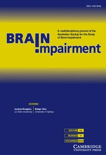
Cognitive and Behavioral Neurology
Scope & Guideline
Fostering Insights at the Nexus of Neurology and Behavior
Introduction
Aims and Scopes
- Cognitive Assessment and Disorders:
Research on cognitive impairments associated with various neurological conditions, including Alzheimer’s disease, frontotemporal dementia, and stroke, emphasizing the importance of cognitive assessments and their clinical implications. - Behavioral Neurology:
Investigations into how neurological conditions affect behavior, including studies on apathy, executive dysfunction, and neuropsychiatric symptoms, which provide insights into patient care and treatment. - Neuroimaging and Neuroanatomy:
Exploration of brain structures and functions through advanced imaging techniques, linking neuroanatomical findings with cognitive and behavioral outcomes in various disorders. - Clinical Interventions and Therapeutics:
Studies focused on the efficacy of different therapeutic approaches, including pharmacological treatments and cognitive rehabilitation strategies, to improve outcomes in patients with neurological disorders. - Neurodevelopmental and Acquired Disorders:
Research on both neurodevelopmental disorders, such as autism spectrum disorder, and acquired conditions resulting from brain injuries or diseases, fostering a comprehensive understanding of cognitive and behavioral challenges.
Trending and Emerging
- Integration of Neuropsychiatry and Behavioral Neurology:
There is an increasing focus on the interplay between neuropsychiatric conditions and neurological disorders, highlighting the importance of a multidisciplinary approach in understanding and treating complex cases. - Impact of Neurodevelopmental Disorders:
A noticeable rise in research addressing neurodevelopmental disorders, particularly in understanding their cognitive and behavioral implications, reflects the growing recognition of these conditions in adult populations. - Application of Advanced Neuroimaging Techniques:
Emerging studies are increasingly utilizing advanced neuroimaging modalities to correlate cognitive functions with brain structure and activity, enhancing the understanding of neural mechanisms underlying cognitive and behavioral changes. - Cognitive Reserve and Resilience:
Research exploring cognitive reserve and resilience in the context of neurological diseases is gaining traction, emphasizing factors that may mitigate cognitive decline and enhance recovery. - Holistic and Patient-Centered Care Approaches:
There is a growing emphasis on holistic approaches that consider the patient's overall well-being, including psychosocial factors, in the management of neurological conditions.
Declining or Waning
- Somatic and Psychosomatic Disorders:
Research related to somatic symptoms and their psychological underpinnings has seen a decrease, indicating a potential shift away from these themes in favor of more neurological and cognitive-focused investigations. - General Memory Studies:
While memory remains a core theme, general studies on memory without direct links to specific neurological conditions or cognitive assessments are becoming less frequent, suggesting a more targeted approach in recent research. - Traditional Neuropsychological Assessments:
The reliance on traditional neuropsychological assessments is waning, with a growing preference for innovative, technology-driven assessments that offer more nuanced insights into cognitive functioning.
Similar Journals

NEUROBIOLOGY OF LEARNING AND MEMORY
Advancing Understanding in Learning and Memory MechanismsNeurobiology of Learning and Memory is a prestigious journal dedicated to the exploration of the neural mechanisms underlying learning and memory processes. Published by Academic Press Inc Elsevier Science, this journal boasts a strong reputation within the field, as evidenced by its impressive impact factor and high quartile rankings in multiple categories, including Q1 in Behavioral Neuroscience and Q2 in Cognitive Neuroscience. Having provided a platform for groundbreaking research since its inception in 1995, the journal aims to disseminate influential findings that further our understanding of cognitive processes, shaped by robust empirical studies and theoretical developments. Researchers and professionals in neuroscience, psychology, and related disciplines will find invaluable insights and advancements that underscore the journal's commitment to fostering knowledge and innovation within these fields. While it currently operates under a subscription model, its comprehensive coverage of crucial topics positions it as a vital resource for those engaged in the intricate study of learning and memory.

Behavioral and Brain Functions
Pioneering Research in Behavioral NeuroscienceBehavioral and Brain Functions is a leading Open Access journal published by BMC, dedicated to advancing the field of behavioral neuroscience, cognitive neuroscience, and biological psychiatry since its inception in 2005. This esteemed journal, based in the United Kingdom, has established itself as a vital resource for researchers and professionals, boasting a remarkable influence demonstrated by its Q1 and Q2 rankings across multiple relevant categories. With its commitment to providing unrestricted access to high-quality research, the journal facilitates the dissemination of significant findings in understanding the complex interactions between behavior and brain function. The journal ranks impressively within the Scopus database, positioning itself among the top-tier publications in its categories, making it an essential platform for academic discourse and innovation. As it converges through 2024, Behavioral and Brain Functions continues to play a crucial role in shaping the forefront of neuroscientific inquiry, inviting contributions that challenge our understanding and promote further exploration in these dynamic fields.

Neuropsychological Trends
Unveiling the Trends Shaping Neuropsychological ResearchNeuropsychological Trends is a prominent, open-access journal published by LED EDIZIONI UNIV, based in Italy. Since its inception in 2007, the journal has dedicated itself to advancing research in the fields of neuropsychology and cellular neuroscience, catering specifically to the evolving trends shaping these disciplines. With the ISSN 1970-321X and an E-ISSN of 1970-3201, the journal provides a platform for multidisciplinary dialogue and exploration of neuropsychological phenomena. While ranked in the fourth quartile for both Cellular and Molecular Neuroscience and Neuropsychology and Physiological Psychology categories in 2023, the journal encourages innovative research that aims to enhance understanding and treatment of cognitive and psychological conditions. The convergence of years from 2011 to 2024 marks a significant period for contributions that inform clinical practice and theoretical frameworks. As researchers, professionals, and students engage with cutting-edge studies and reviews, Neuropsychological Trends serves as a vital resource for staying informed and fostering collaboration in the neuropsychological community.

Applied Neuropsychology-Child
Transforming child neuropsychology with impactful research.Applied Neuropsychology-Child is a leading academic journal dedicated to advancing the field of developmental and educational psychology, as well as neuropsychology, with a particular focus on child development. Published by Routledge Journals, Taylor & Francis Ltd, this journal provides critical insights into the cognitive and behavioral aspects of children, fostering interdisciplinary dialogue among researchers, clinicians, and educators. With a commendable impact factor and a categorization of Q3 in both associated fields for 2023, the journal plays a pivotal role in shaping current practices and enhancing academic discourse. Access to Applied Neuropsychology-Child is available through subscription, ensuring that high-quality research is disseminated widely amongst scholars and professionals. Since its inception in 2012, this journal has consistently aimed to illuminate the challenges and developments in child neuropsychology, making it an essential resource for anyone invested in the psychological well-being and educational success of children.

BRAIN RESEARCH
Unlocking the mysteries of the brain, one study at a time.BRAIN RESEARCH is a premier journal published by Elsevier, specializing in the intricate domains of neuroscience, developmental biology, and molecular biology. Established in 1966, this esteemed publication has become a cornerstone for researchers, professionals, and students dedicated to advancing our understanding of brain function and disorders. With an impressive impact factor and a consistent presence in the Q2 quartiles across key categories—such as Developmental Biology, Neurology, and Neuroscience—it stands out as an essential resource for disseminating innovative research and pioneering insights. The journal's scope encompasses both clinical and fundamental studies, fostering a multidisciplinary approach to the complexities of neural systems. Although it is not an open-access journal, BRAIN RESEARCH provides a vital platform for sharing progressive findings that can inspire future studies and contribute significantly to the evolutionary discourse in neuroscience. Based in the Netherlands, at RADARWEG 29, 1043 NX AMSTERDAM, BRAIN RESEARCH continues to shape the landscape of neuroscience research, inviting submissions that explore the latest discoveries and therapeutic strategies.

Brain Impairment
Unraveling the complexities of brain function.Brain Impairment, published by Cambridge University Press, is a pivotal academic journal dedicated to advancing the understanding of neurological conditions and cognitive processes. With its ISSN 1443-9646 and E-ISSN 1839-5252, this esteemed journal has been at the forefront of research in the fields of Behavioral Neuroscience, Cognitive Neuroscience, and Neuropsychology since its inception in 2004. Covering a broad scope, it addresses critical insights into brain function, impairments, and therapies, making it a valuable resource for researchers, clinicians, and students alike. Brain Impairment holds various rankings, including Q4 in Behavioral Neuroscience and Q2 in Speech and Hearing, reflecting its significance in the academic community. While the journal operates under print access, its rich content serves as an essential reference for professional development and scholarly discussion in the UK and beyond. Researchers and practitioners can rely on this journal to provide cutting-edge research and reviews that inform clinical practice and shape future studies in neurology and cognitive neuroscience.

CLINICAL EEG AND NEUROSCIENCE
Advancing the Frontiers of Neurological ResearchCLINICAL EEG AND NEUROSCIENCE, published by SAGE Publications Inc, stands as a pivotal journal in the fields of neurology and neuroscience, with a focus on the latest research and advancements in clinical electroencephalography and neurophysiology. Since its inception in 1970, the journal has provided a platform for rigorous scholarly work, offering valuable insights into neurological disorders and EEG technology. With its current categorization in the Q2 and Q3 quartiles across various subfields of medicine and neurology, it ranks prominently in the Scopus database, emphasizing its significance in academic discourse. The journal's commitment to disseminating high-quality research is underscored by its open access options, facilitating broader accessibility to its published findings. For researchers, clinicians, and students alike, CLINICAL EEG AND NEUROSCIENCE remains an essential resource for keeping abreast of the evolving landscape of neurological studies.

Zeitschrift fur Neuropsychologie
Advancing the Frontiers of Neuropsychological ResearchZeitschrift für Neuropsychologie, published by HOGREFE AG in Switzerland, stands as a vital resource for scholars and practitioners in the fields of neuropsychology, cognitive neuroscience, and psychiatry. With an ISSN of 1016-264X and E-ISSN 1664-2902, this journal aims to disseminate high-quality research that enhances understanding of cognitive processes and their implications for mental health. While currently classified in the fourth quartile across relevant categories, including Cognitive Neuroscience and Neuropsychology, it offers valuable insights that contribute to the emerging discourse in these areas. By publishing both empirical studies and theoretical papers, it encourages interdisciplinary dialogues among researchers and clinicians. Although the journal is not Open Access, its role in advancing neuropsychological research is significant, fostering academic linkages from its base in Bern, Switzerland. By continually focusing on the latest advancements and fostering innovative approaches within the field, Zeitschrift für Neuropsychologie remains a crucial platform for those committed to exploring the complexities of the human mind.

Journal of Integrative Neuroscience
Advancing Neuroscience Through Interdisciplinary InnovationWelcome to the Journal of Integrative Neuroscience, a prominent platform dedicated to advancing the field of neuroscience by fostering interdisciplinary research and innovation. Published by IMR PRESS, this open-access journal has been committed to disseminating high-quality research since its inception in 2002, with a vision to integrate various aspects of neuroscience, from theoretical foundations to applied methodologies, ultimately enhancing our understanding of the brain and nervous system. With an evolving presence in the academic community, the journal holds significant rankings, such as Q2 in Medicine and Q3 in Neuroscience for 2023, reflecting its growing impact and value to researchers and professionals alike. The journal is accessible globally, having adopted an open-access model in 2018, ensuring that vital neuroscience findings reach a broader audience without barriers. Positioned in Singapore and serving an international readership, the Journal of Integrative Neuroscience is your essential resource for the latest insights and discoveries in a rapidly evolving field.

Journal of Cognitive Enhancement
Transforming Knowledge into Practice for Cognitive Growth.Journal of Cognitive Enhancement, published by SpringerNature, is a premier academic platform dedicated to advancing knowledge in the fields of Cognitive Neuroscience, Behavioral Neuroscience, and Experimental Psychology. With an electric combination of rigorous research and innovative practice, this journal has established itself as an essential resource for researchers, professionals, and students interested in understanding the mechanisms behind cognitive enhancement and its implications for mental health and cognitive function. As of 2023, it is recognized in the Q2 and Q3 quartiles across several categories, demonstrating its solid impact in the academic community, particularly with an impressive Scopus ranking of #27/76 in Neuropsychology and Physiological Psychology. Operating in a competitive landscape, the Journal of Cognitive Enhancement fosters open dialogue and collaboration through valuable contributions to cognitive research, facilitating insights that are crucial for practical applications in clinical and educational settings. While specific open access options are currently not defined, we encourage all interested scholars to explore the rich database of published works dating from 2017 to 2024, contributing to this dynamic field of study.